White concrete countertops have gained immense popularity in recent years for their sleek, modern aesthetic and the versatility they bring to kitchen and bathroom designs. The appeal of these countertops lies not only in their minimalist charm but also in the strength and durability concrete offers as a material. When crafted and sealed properly, white concrete countertops can offer a perfect balance of elegance and functionality, transforming your space into a contemporary haven.
The process of creating these countertops allows for customization in terms of texture, finish, and even embedded decorative elements. This makes white concrete countertops a highly appealing option for those looking to combine style with substance. The clean and neutral hue of white enhances the feeling of openness in a kitchen, making it ideal for both small and large spaces. However, achieving that pristine look and ensuring long-term durability requires attention to several key aspects, from proper mixing and casting techniques to the right type of sealant.
One of the defining characteristics of white concrete countertops is their ability to mimic high-end materials like marble or quartz while offering the unique edge of handmade craftsmanship. Each countertop is created from scratch, often poured in place or precast to fit the exact dimensions of the kitchen or bathroom. This level of customization means that no two countertops are exactly alike, adding a personal touch to your space.
The white color, when properly achieved, provides a striking contrast to darker elements in the room, such as cabinetry or floors, or it can serve as a seamless complement to other light-toned decor. Concrete’s natural texture also allows for a variety of finishes, from smooth and polished to rough and industrial, depending on the aesthetic you aim for. Whether you desire a matte finish or a glossy, reflective surface, white concrete countertops can be tailored to meet your specific preferences.
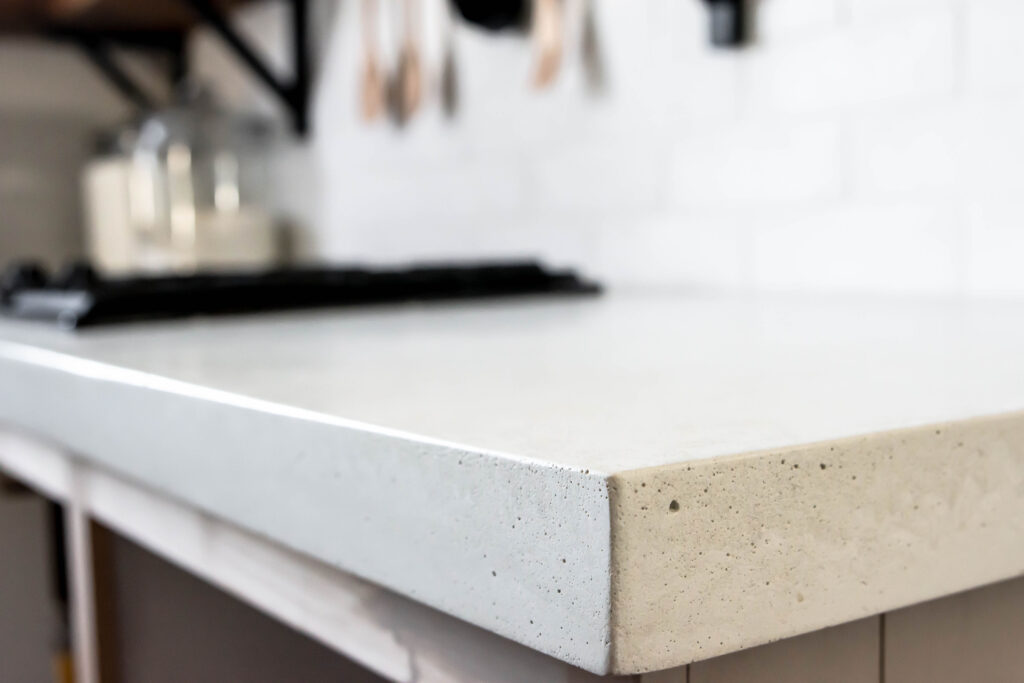
The process of making white concrete countertops is an involved one that requires precision. Unlike regular gray concrete, which can be more forgiving in terms of mix and color consistency, white concrete demands specific ingredients to achieve a pure, bright color. White cement is used in place of standard gray cement, and other additives, like finely crushed white aggregates and pigments, help enhance the clarity of the color. The water-to-cement ratio is crucial in maintaining the right consistency and avoiding discoloration or surface cracking.
Once the mix is prepared, it is poured into custom molds designed for the countertop’s shape. During the curing process, great care must be taken to prevent shrinkage or cracking, as these issues could detract from the overall aesthetic and strength of the final product. Curing also plays a major role in the development of the concrete’s color; the moisture levels and the environment where the countertop cures can impact how the final product appears.
While white concrete countertops are renowned for their beauty and strength, they do require some level of maintenance to ensure they remain in prime condition. Sealing is essential, as concrete is naturally porous, meaning that unsealed countertops could absorb liquids, leading to stains and potential damage. Given the light color of white concrete, stains from oils, wines, and even water spots can be more visible compared to darker surfaces.
Using a high-quality, food-safe sealant helps protect the countertop from spills and stains, making it easier to clean and maintain over time. Additionally, sealants can add to the finish, offering options from a natural matte appearance to a high-gloss, polished look. The sealant also acts as a barrier against heat, preventing the countertop from being damaged by hot pots and pans.
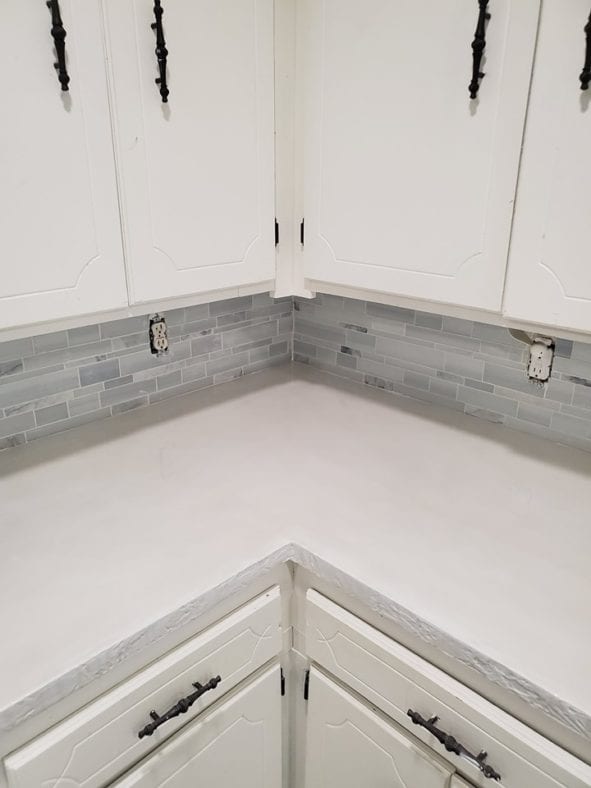
Durability is one of the primary reasons homeowners opt for white concrete countertops, as concrete is known for its strength and ability to withstand heavy use. However, despite its durability, concrete can be prone to cracking if not reinforced properly or if it undergoes extreme temperature changes. Reinforcing the countertop with materials like fiber mesh or rebar during the casting process can help reduce the risk of cracks forming over time.
Minor surface cracks can sometimes occur as the concrete ages, but these can often be filled and repaired without compromising the integrity of the countertop. Additionally, the thickness of the countertop plays a role in its long-term strength, with most countertops being between 1.5 to 3 inches thick, depending on the design.
The versatility of white concrete countertops extends beyond just their aesthetic and functional appeal. One of the most attractive aspects of concrete is its ability to be customized with embedded materials. Homeowners can personalize their countertops with elements like glass chips, stones, or even metal accents, creating a unique design that reflects their style. These embedded features can add texture and visual interest to the smooth, clean surface of the white concrete, offering a one-of-a-kind statement piece. Additionally, concrete can be cast into virtually any shape, allowing for custom edges, curves, and even integrated sinks or backsplashes.
Sustainability is another reason why many homeowners are turning to concrete countertops. Concrete can be made with eco-friendly materials such as recycled aggregates and natural pigments. Additionally, it can last for decades when properly maintained, reducing the need for frequent replacements. The use of concrete as a countertop material is often seen as a more sustainable option compared to mined materials like granite or quartz, which require significant energy and resources to extract and transport. Concrete’s long lifespan, combined with its recyclability, makes it a more environmentally conscious choice for those looking to reduce their home’s carbon footprint.
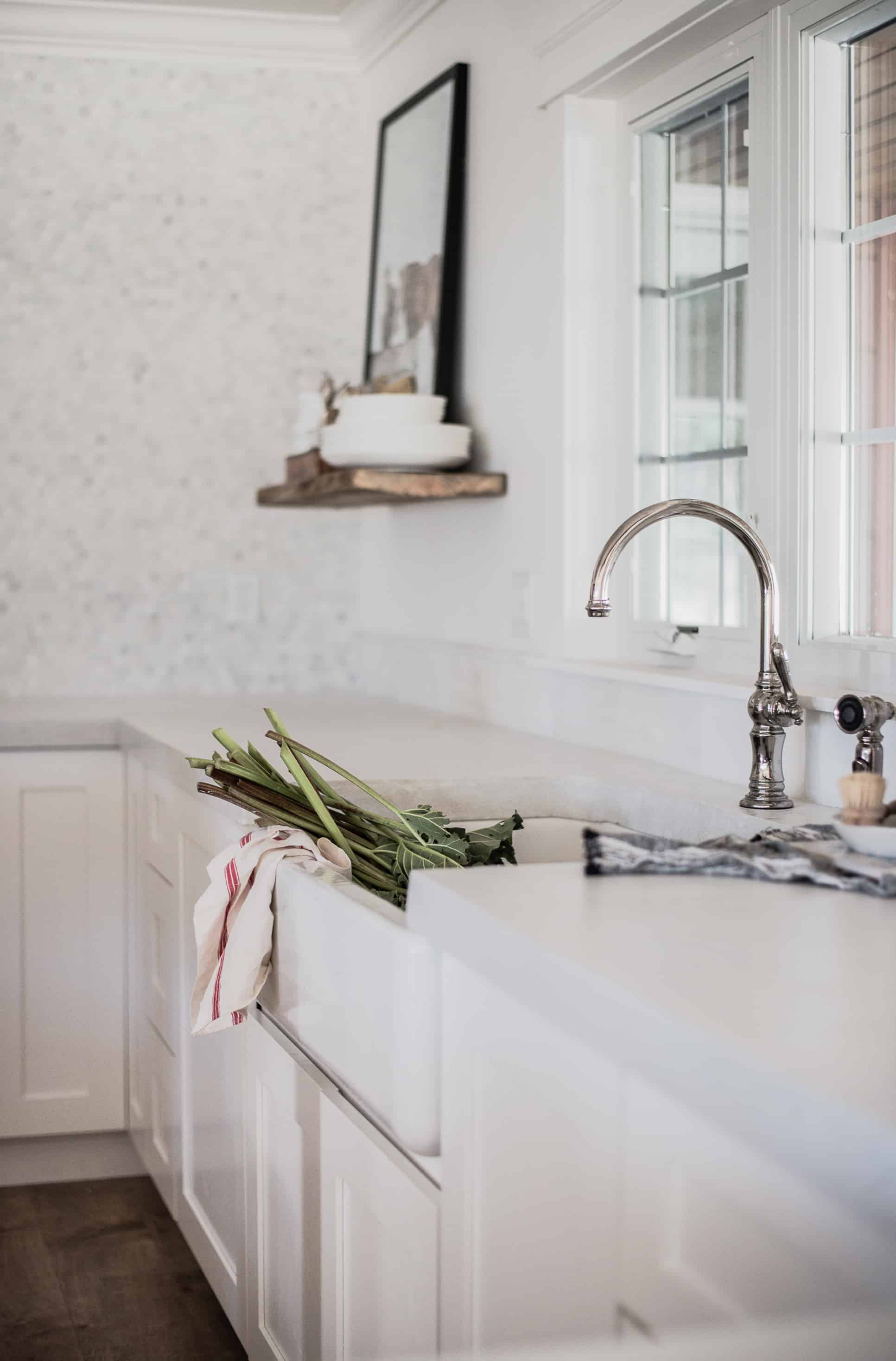
Over time, white concrete countertops may develop a natural patina, which many homeowners find appealing. This aging process gives the countertops a lived-in, rustic charm, adding character to the overall look. The patina can be influenced by the countertop’s exposure to various elements, such as sunlight, moisture, and daily use.
While some homeowners prefer the pristine look of freshly sealed concrete, others embrace the evolving nature of the material. Regular resealing can help preserve the original appearance, or you can allow the countertop to age gracefully, depending on your design preference.
The cost of white concrete countertops can vary depending on the complexity of the design, the materials used, and whether you choose to hire a professional or tackle the project as a DIY endeavor. Professionally installed countertops tend to be more expensive, particularly if custom molds or decorative elements are incorporated into the design.
However, the investment in professional craftsmanship can pay off in terms of durability and the flawless finish achieved. For those with DIY experience, creating your concrete countertops can be a cost-effective solution, though it requires time, patience, and the right tools to ensure success.

In terms of resale value, white concrete countertops can enhance the overall appeal of a home, particularly for buyers who appreciate modern or industrial design elements. While concrete countertops may not be as universally recognized as granite or quartz, their growing popularity and the trend toward minimalist, sustainable living can make them a desirable feature in a competitive housing market. A well-maintained concrete countertop can set your kitchen or bathroom apart, offering a unique selling point that could attract design-conscious buyers.
The ability to customize the color of white concrete countertops is another advantage that sets them apart from other materials. While the classic bright white look is often the goal, slight variations in the shade can be achieved through the use of pigments or stains. Some homeowners may prefer a softer, off-white tone that complements warmer color schemes, while others might opt for a crisp, pure white that contrasts sharply with darker cabinetry. This flexibility allows white concrete countertops to suit a wide range of interior styles, from industrial chic to farmhouse charm.
In terms of cleaning, white concrete countertops are relatively low maintenance once sealed properly. A simple solution of mild dish soap and water is usually sufficient for everyday cleaning, while more stubborn stains can be addressed with a baking soda paste. It’s important to avoid harsh chemicals or abrasive scrubbers, as these can damage the sealant and expose the porous surface of the concrete. Regularly reapplying the sealant, typically once every year or two, will help maintain the countertop’s resistance to stains and ensure its longevity.

Common Mistakes to Avoid:
One of the most common mistakes when installing white concrete countertops is neglecting the proper sealing process. Because concrete is a porous material, failing to apply an adequate sealant can result in stains and water damage over time, particularly with lighter colors like white.
Another frequent issue is improper mixing of the concrete. Achieving a consistent, bright white finish requires precise ratios of cement, water, and aggregates, and any deviations can lead to discoloration or weak spots.
In addition, not allowing enough curing time before using the countertop is a common error that can cause cracks and other damage. Many DIY enthusiasts underestimate the curing time, which can be several days to a few weeks, depending on the mix and environmental conditions. Lastly, failure to reinforce the countertop properly can result in structural issues over time, as concrete is prone to cracking if not adequately supported.
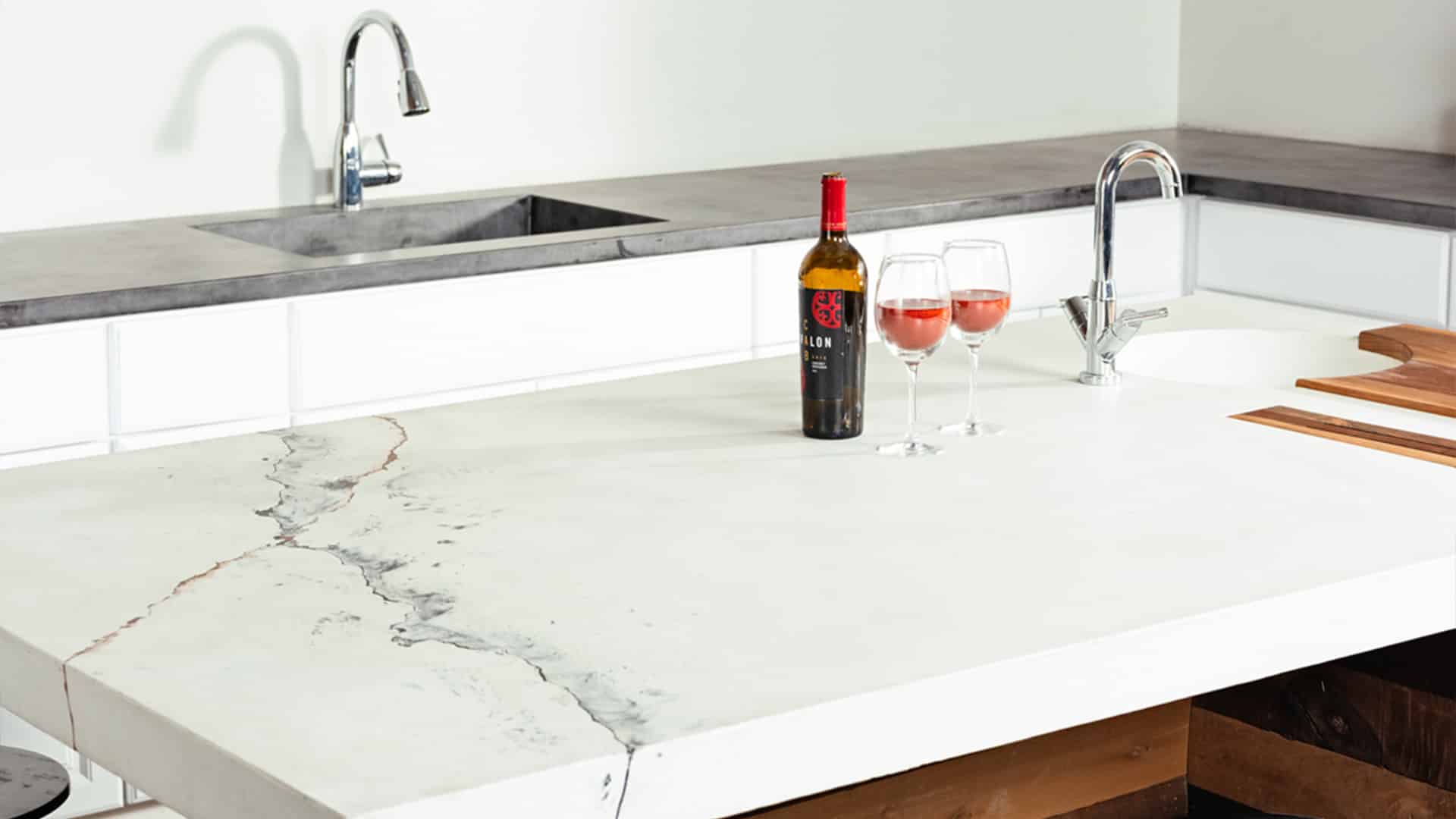
How long do white concrete countertops last?
White concrete countertops can last for decades when properly sealed and maintained. With regular care, such as resealing every one to two years, these countertops can retain their beauty and functionality over time. Their durability depends on factors like reinforcement, curing, and the environment in which they are installed.
Are white concrete countertops easy to maintain?
Yes, they are relatively easy to maintain once sealed. Regular cleaning with mild soap and water is usually sufficient. However, because concrete is porous, it’s crucial to keep them sealed to avoid stains. Periodic resealing will help keep the surface protected from damage and make cleaning even easier.
Can I install white concrete countertops myself?
Yes, it is possible to install white concrete countertops as a DIY project, but it requires patience, precision, and the right tools. The process involves creating molds, mixing concrete, and ensuring proper curing and sealing. For those without prior experience, it may be best to consult a professional to avoid common mistakes.

What sealant should I use for white concrete countertops?
A food-safe, high-quality penetrating sealant is recommended for white concrete countertops. Sealants come in various finishes, including matte, satin, and glossy, allowing you to choose the look you prefer. Ensure the sealant is water- and stain-resistant, especially in kitchens where spills are common.
Do white concrete countertops crack easily?
While concrete is a durable material, it is susceptible to cracking if not properly reinforced or if exposed to extreme temperature changes. Reinforcing the countertop with materials like rebar or fiber mesh during installation can help prevent cracks. Additionally, maintaining consistent temperatures and avoiding placing hot items directly on the surface will reduce the risk of cracking.
Are white concrete countertops environmentally friendly?
Yes, concrete countertops are considered environmentally friendly, especially when made with sustainable materials like recycled aggregates. Additionally, their long lifespan means they do not need to be replaced frequently, reducing waste. For eco-conscious homeowners, white concrete countertops can be an excellent choice for both style and sustainability.
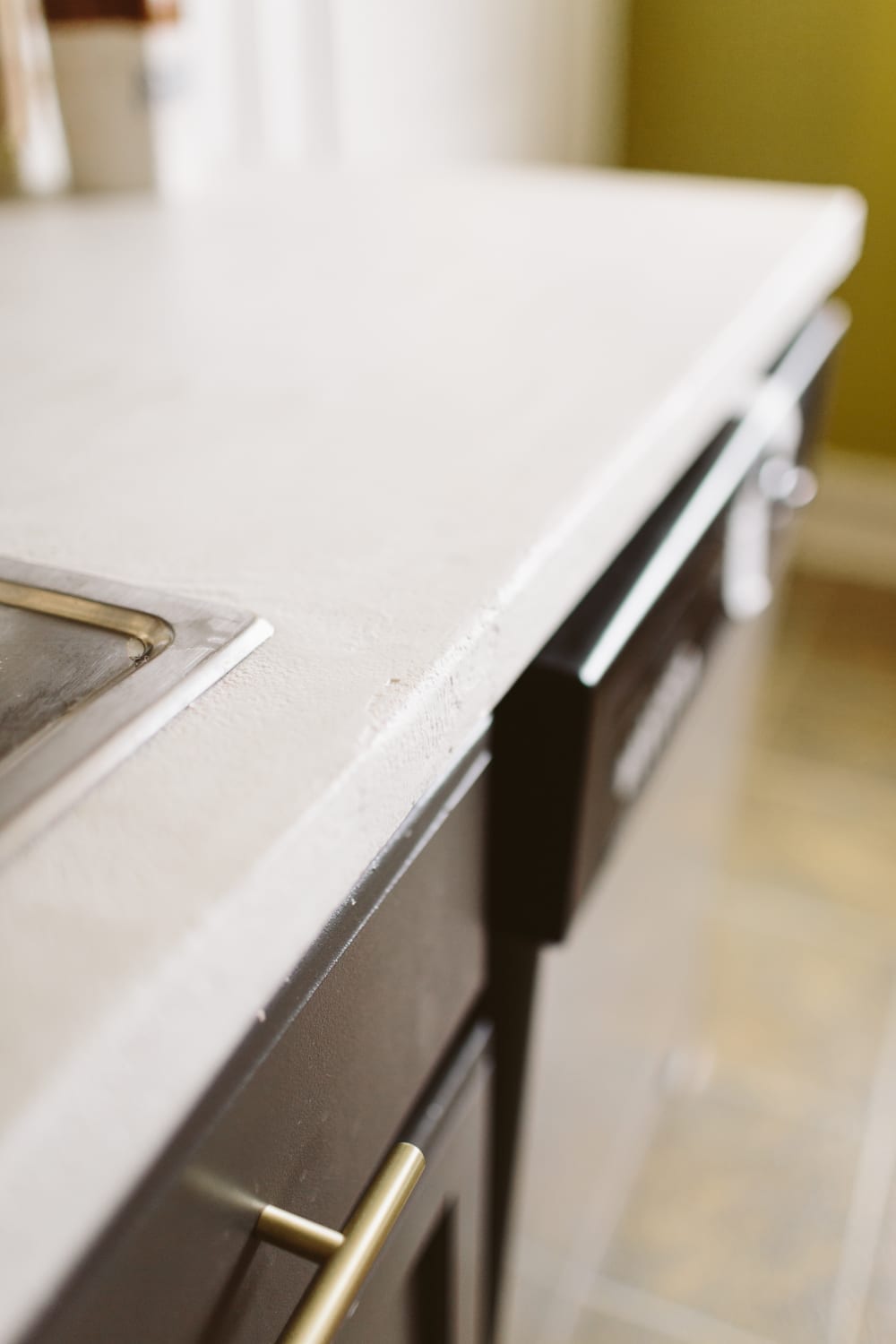
DIY Concrete Countertops, Part II – The Pour – Domestic Imperfection
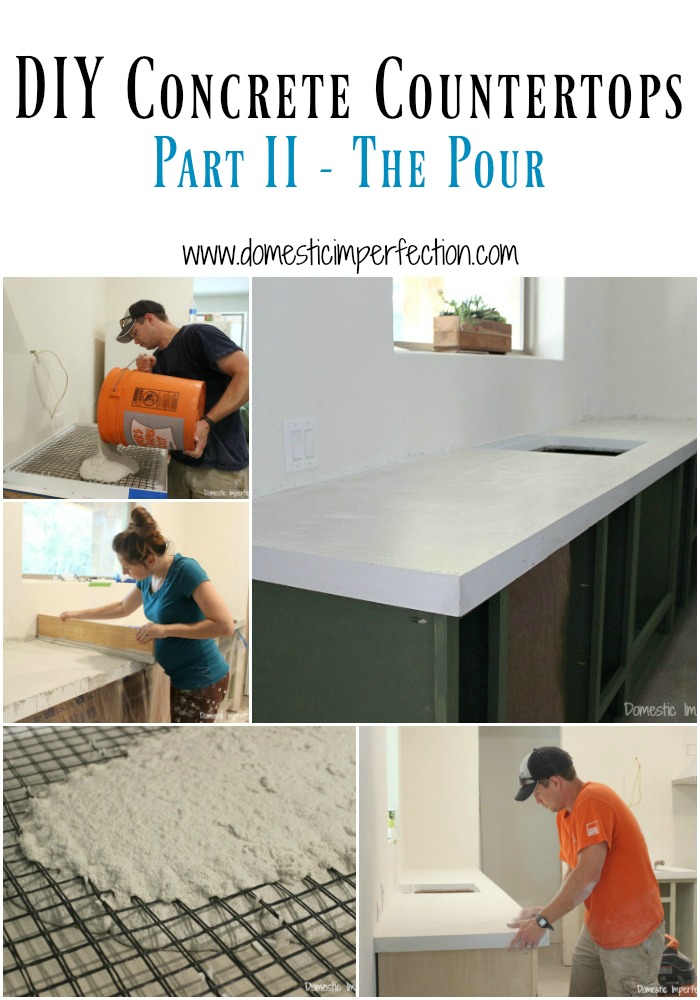
DIY White Concrete Countertops White concrete countertops

Related articles:
- Concrete Countertop Overlay
- Black Concrete Countertops
- Marble Look Concrete Countertops
- Light Grey Concrete Countertops
- Concrete Countertop Design Ideas
- Light Colored Concrete Countertops
- Epoxy On Concrete Countertop
- Concrete Countertops Designs
- Concrete Countertops That Look Like Wood
- White Concrete Countertops